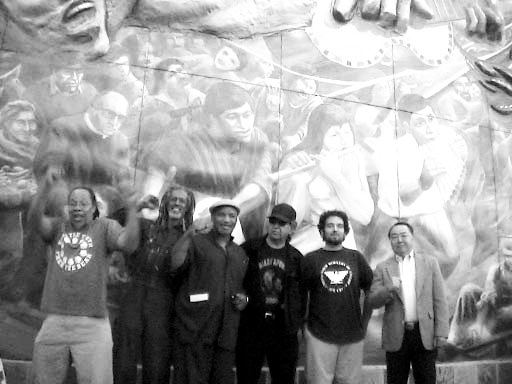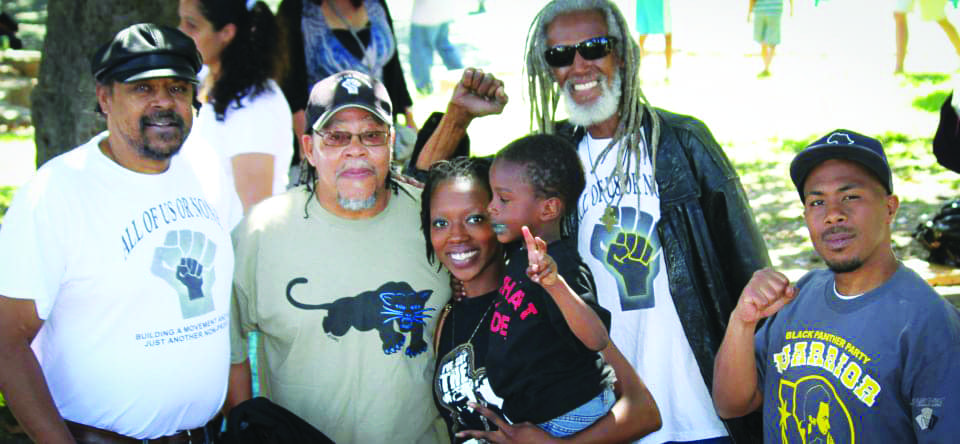Black
August, a month for reflection, struggle, sacrifice and resistance
July 11, 2012
by Willie Sundiata Tate
In October 2004, legendary heroes of the struggle Sundiata
Tate of the San Quentin 6, Elder Freeman and Geronimo ji Jaga of the Black
Panther Party, Luis Bato Talamantez of the San Quentin 6, Mateo of CPF and
Richard Aoki of the Black Panther Party gathered at La Pena Cultural Center. Geronimo
and Richard Aoki have since joined the ancestors.
For me Black August means many things. It is the beginning of Haiti’s
revolution. It was in August that the first Black indentured servants/slaves
landed in Jamestown that began our long journey of horror in what became known
as the United States. It is about Nat Turner’s slave uprising and Gabriel
Prosser’s attempt at the same.
It is a month of reflection on the losses that we as a people have suffered
in that month. It is a month of courageous struggle and sacrifice. It is a
month of resistance. It is a month of high elation and extreme sorrow – elation
for our resistance, sorrow for our losses.
For me, the three most significant events of August are Jonathan Jackson’s
raid on the Marin County Courthouse in 1970, the August 1971 liberation of the
San Quentin Adjustment Center by Comrade George Jackson and Nat Turner’s slave
uprising.
Jonathan’s “audacity, audacity and more audacity” describes the move of Aug.
7, 1970, in which he liberated William Christmas, James McClain and Ruchell
Magee for a short time before being shot dead. Jonathan’s raid was an attempt
to free not only those brothers, but in taking hostages he sought to have
bargain chips to later trade in for his brother’s freedom.
Of course, it was not just about the freedom of George, but it was also
about freeing all George’s comrades. To me, Jonathan is a hero. His heroic act
had the impact of making many of us inside even more committed to the struggle
and willing to give up our lives to the revolution. His act was totally
inspiring!
In my opinion, Nat Turner and George Jackson are forever linked by events
that took place 140 years apart. The day that George was shot in the head by
prison officials as he laid wounded on the ground just happened to be the same
day that Nat Turner began his insurrection.
If Comrade had chosen that day to liberate instead of having it forced upon
him by prison officials in their initial attempt to assassinate him, he could
not have chosen a better day. They both were about making revolution in their
lifetime. Nat sought to end Black slavery by rising up and killing the slave
owners, thereby freeing the slaves.
Jonathan
Jackson’s heroic act had the impact of making many of us inside even more
committed to the struggle and willing to give up our lives to the revolution.
His act was totally inspiring!
Comrade George sought to end neo-slavery by educating the people to the
evils and inhumanity of a racist, oppressive capitalist system and to show that
resistance is always possible as long as you have the will and the courage to
do so. He showed that if you could come together, you could do some things; you
could make some changes.
He gave his life to the struggle for self-determination, which to him was
more important than life itself: “I don’t care how long I live. Over this I
have no control, but I do care about what kind of life I live, and I can
control this. I may not live but another five minutes, but it will be five
minutes definitely on my terms … I’ll never, never trade my self-determination
… control over the circumstances that surround my existence is of the first
importance to me,” he wrote in “Soledad Brother.”
Comrade hated the capitalist system; he hated how it played workers off
against one another and how it turned people against themselves. He knew that
those who govern have a responsibility to the rest of us to represent us by
providing from the cradle to the grave an “equitable share of wealth and
privilege.” “Meaningful social roles, education, medical care, food, shelter
and understanding should be guaranteed at birth,” he said.
He knew that wealth, land and resources should be held in common for all.
There should not be a hierarchy that stood above us all. In his personal life,
George would share with others whatever commissary that he had. He didn’t have
to know you. He truly believed in looking out for those who did not have. He
was a true example of what a revolutionary “who is guided by true feelings of
love” does in practice.
“I don’t
care how long I live. Over this I have no control, but I do care about what
kind of life I live, and I can control this. I may not live but another five
minutes, but it will be five minutes definitely on my terms … I’ll never, never
trade my self-determination … control over the circumstances that surround my
existence is of the first importance to me.” – George Jackson
Personally, for me it is a time of painful remembrance. The memory of
Jonathan Jackson’s raid on Marin County Courthouse is painful. William Christmas
I knew personally; I had chopped it up with him on the yard at San Quentin on
several occasions. On the morning of his death, as he was in the foyer area, I
joked with him and he didn’t respond. This was not like him. Later on, I
realized that he most likely had something heavier on his mind. I personally
knew Ruchell Magee, who still languishes in a California prison 42 years later.
Remembering Aug. 21, 1971, when Comrade George Jackson had his life snuffed
out, is painful. To know that prison officials got away with murder on that day
and have never paid any dues for the crime that they committed against one of
our greatest teachers, resisters and leaders is painful. In fact, in court they
lied about how he died, thereby covering up his murder.
It was a day of brutal beatings and nigger callings, of lying naked on the
grass while hogtied. It was a day of extreme humiliation, of being forced to
crawl on one’s elbows and knees, and listening to prison guards singing songs
about “George Jackson laying arotting in his grave.” I am sure that Nat Turner
experienced worse as he waited to be hanged.
It was also a day of vengeance, where prisoners took revenge against their
tormentors, prison guards, slaying three of them along with two trustees, who
unfortunately were in the wrong place at the wrong time. I am sorry for them.
To know
that prison officials got away with murder on that day and have never paid any
dues for the crime that they committed against one of our greatest teachers,
resisters and leaders is painful.
Out of the events of that day, six prisoners, Hugo Pinell, Fleeta Drumgo,
Luis Talamantez, David Johnson, Johnny Spain and Willie Sundiata Tate were
singled out for punishment by the state and became known as the San Quentin
Six. In 1971, legal proceeding were initiated against the six.
On Aug. 12, 1976, our trial ended with acquittals for three of us. David
Johnson and Hugo Pinell were convicted of assaults. Johnny Spain was convicted
of conspiracy to murder. Johnny was released many years ago.
All of Us or None members Arthur Lee, Sundiata Tate and
Elder Freeman enjoy the Malcolm X Jazz Festival on May 19, 2012, with Laren,
Reese and Minister of Information JR. – Photo: Block Report Radio
It is only Hugo who remains locked down in the SHU at Pelican Bay. We all faced
assaults by prison staff, but none of us faced the kind of torture on a daily
basis that Hugo Pinell suffered. That brother had clubs stuck up his ass and
was assaulted as he travelled back and forth from San Quentin to court in Salinas,
California, where he was a defendant on another case.
Hugo knows what pain is. Sometimes, after he returned from court, he would
have blood dripping from his face and, occasionally, there would be a tear in
his eyes. He never complained. He silently pushed on. He was and is a soldier.
But it is time for him to come home. Other than prison medical personnel or
prison guards, he hasn’t touched another human being since 1976.
In a letter written in 2007, Hugo says, “As you know, I haven’t had a
contact visit since December 1970.” He says further, “My point is that, with
this isolation and with the board having so much juice, my situation is deeper
because they can keep using more BS to say I’m not suitable for release. Thus
I’m really doing life without (the possibility of parole) even though my time
was completed long ago.”
This brother wrote this after he had already done 43 years. At present he
has been locked up 47 years. Speaking on his conditions of confinement, he
says: “In the SHUs, you can’t have much of anything. More importantly, you
can’t have contact visits, period! In 2009 I was given a 15-year denial … I
would be bullshitting you if I didn’t admit this hurt. It has hurt me all
along, especially not being able to touch mom, grandmom and others.”
The recent hunger strikes in the segregation units of several California
prisons was an attempt to address some of the issues that Hugo has spoken of in
many of his letters. The sensory deprivation, as you can see from Hugo’s words,
clearly is one of the worst things that you can do to another human being. It
is considered inhumane by international standards.
How can this continue to happen in the US of A? It is just the same as when
police in our inner cities decide to murder innocent people without due process
of a trial. This happens throughout the US of A and has been condemned
internationally. How many cops have served time for such murders? It is almost
unheard of.
The
sensory deprivation, as you can see from Hugo’s words, clearly is one of
the worst things that you can do to another human being. It is considered
inhumane by international standards. How can this continue to happen in the US
of A?
The criminal justice system is biased against us and all people of color as
well as the poor. In today’s atmosphere, where working and poor people are
catching hell all over the landscape, it is interesting that those on the very
bottom of society – prisoners – are rising up, being fed up with living a
torturous existence and trying to do something about it.
It is only fitting that we who are also suffering stand up and fight against
those who want to hold us down while profiteering off the sweat of the working
class. The downtrodden will rise and so will working class and poor people.
Willie Sundiata Tate can be reached at 1down2togo@att.net.
--
SIGN THE JERICHO COINTELPRO PETITION!
Free All Political Prisoners!
nycjericho@gmail.com • www.jerichony.org

